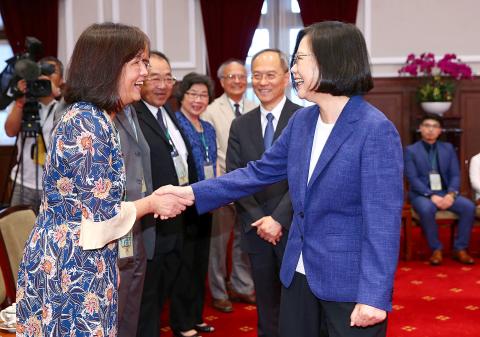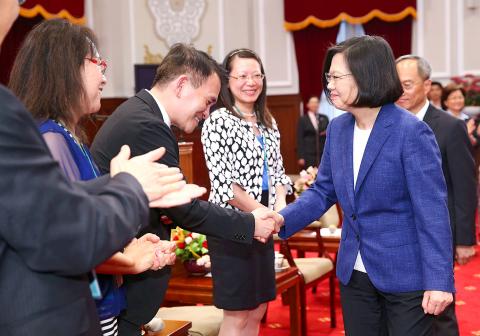President Tsai Ing-wen (蔡英文) yesterday urged the US to include Taiwan in an exemption list for its tariffs on steel and aluminum imports.
“A stable economic partnership between Taiwan and the US plays a positive role in Washington’s economic security,” Tsai said. “We hope the US will include Taiwan in the exemption list for tariffs imposed on steel and aluminum imports under Section 232 of the Trade Expansion Act of 1962.”
She made the remarks while meeting with a delegation from the US-China Economic and Security Review Commission at the Presidential Office Building in Taipei.

Photo: CNA
US President Donald Trump on March 8 signed an order to impose a 25 percent tariff on steel imports and a 10 percent tariff on aluminum imports.
The order includes a provision that nations seeking exemption from the tariffs are allowed to propose “satisfactory alternative means” to address trade inequities.
It was the first time in more than three decades that the US invoked the law to protect a domestic industry from the competition brought about by imports.

Photo: CNA
Despite talks with the US, Taiwan has not been added to the exemption list, but has vowed to obtain the status through continued negotiations.
During the meeting with the delegation, Tsai said that Taiwan would continue to engage in constructive dialogue with the US on a wide range of economic and trade issues, adding that she hoped the commission could help advance the two nations’ strategic economic partnership.
To strengthen ties with the US, Taiwan is to send a large delegation to Washington to participate in next month’s “SelectUSA” investment summit, which focuses on direct investments in the US, she said.
Tsai said she was delighted that 172 US representatives and 13 senators had written to the WHO to express their support for Taiwan’s participation in this year’s World Health Assembly, from which it has been excluded.
Taiwan had hoped to attend the meeting as an observer, as it did from 2009 to 2016, but did not receive an invitation because of Beijing’s opposition.
The US Congress in 2000 established the commission to monitor, investigate and submit an annual report to the legislature on the national security implications of the economic relationship between Washington and Beijing.
The delegation included commission vice chairwoman Carolyn Bartholomew and commissioners Roy Kamphausen, Jonathan Stivers, Katherine Tobin and Larry Wortzel, the Presidential Office said.

INVESTIGATION: The case is the latest instance of a DPP figure being implicated in an espionage network accused of allegedly leaking information to Chinese intelligence Democratic Progressive Party (DPP) member Ho Jen-chieh (何仁傑) was detained and held incommunicado yesterday on suspicion of spying for China during his tenure as assistant to then-minister of foreign affairs Joseph Wu (吳釗燮). The Taipei District Prosecutors’ Office said Ho was implicated during its investigation into alleged spying activities by former Presidential Office consultant Wu Shang-yu (吳尚雨). Prosecutors said there is reason to believe Ho breached the National Security Act (國家安全法) by leaking classified Ministry of Foreign Affairs information to Chinese intelligence. Following interrogation, prosecutors petitioned the Taipei District Court to detain Ho, citing concerns over potential collusion or tampering of evidence. The

‘FORM OF PROTEST’: The German Institute Taipei said it was ‘shocked’ to see Nazi symbolism used in connection with political aims as it condemned the incident Sung Chien-liang (宋建樑), who led efforts to recall Democratic Progressive Party (DPP) Legislator Lee Kun-cheng (李坤城), was released on bail of NT$80,000 yesterday amid an outcry over a Nazi armband he wore to questioning the night before. Sung arrived at the New Taipei City District Prosecutors’ Office for questioning in a recall petition forgery case on Tuesday night wearing a red armband bearing a swastika, carrying a copy of Adolf Hitler’s Mein Kampf and giving a Nazi salute. Sung left the building at 1:15am without the armband and apparently covering the book with a coat. This is a serious international scandal and Chinese

Seventy percent of middle and elementary schools now conduct English classes entirely in English, the Ministry of Education said, as it encourages schools nationwide to adopt this practice Minister of Education (MOE) Cheng Ying-yao (鄭英耀) is scheduled to present a report on the government’s bilingual education policy to the Legislative Yuan’s Education and Culture Committee today. The report would outline strategies aimed at expanding access to education, reducing regional disparities and improving talent cultivation. Implementation of bilingual education policies has varied across local governments, occasionally drawing public criticism. For example, some schools have required teachers of non-English subjects to pass English proficiency

TRADE: The premier pledged safeguards on ‘Made in Taiwan’ labeling, anti-dumping measures and stricter export controls to strengthen its position in trade talks Products labeled “made in Taiwan” must be genuinely made in Taiwan, Premier Cho Jung-tai (卓榮泰) said yesterday, vowing to enforce strict safeguards against “origin laundering” and initiate anti-dumping investigations to prevent China dumping its products in Taiwan. Cho made the remarks in a discussion session with representatives from industries in Kaohsiung. In response to the US government’s recent announcement of “reciprocal” tariffs on its trading partners, President William Lai (賴清德) and Cho last week began a series of consultations with industry leaders nationwide to gather feedback and address concerns. Taiwanese and US officials held a videoconference on Friday evening to discuss the